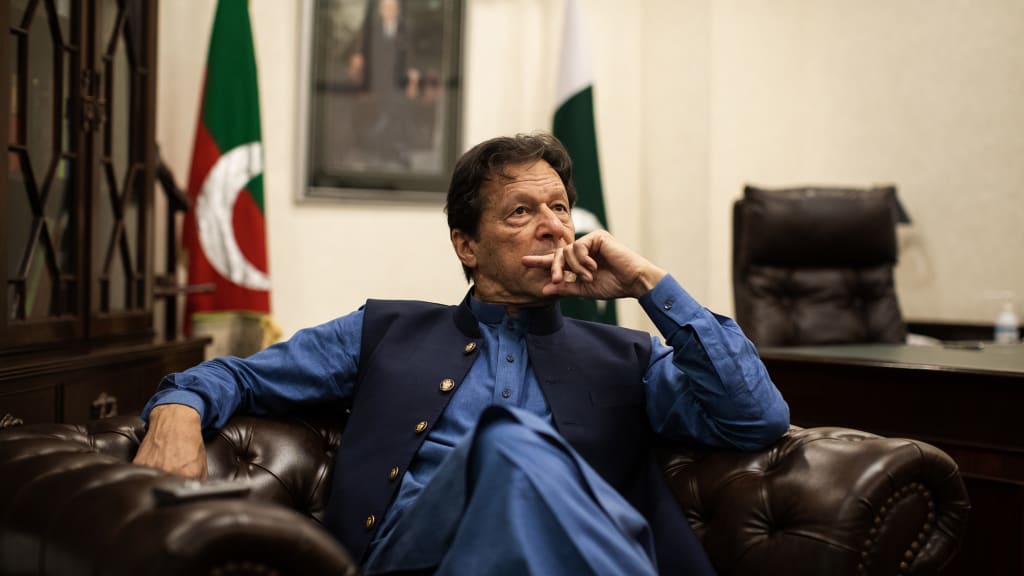Imran Khan: The Cricketing Legend turned Prime Minister of Pakistan
A Journey of Triumph, Philanthropy, and Leadership

Imran Khan, a prominent figure in Pakistan's history, has had an extraordinary journey from being a legendary cricketer to becoming the Prime Minister of the country. His life is a story of determination, passion, and unwavering commitment to making a difference. Imran Khan's achievements both on and off the cricket field have left an indelible mark on the nation, shaping him into the charismatic leader he is today.
Born on October 5, 1952, in Lahore, Pakistan, Imran Khan was raised in an affluent family. His father was a civil engineer, and his mother came from a prominent Pashtun family. Imran's privileged upbringing didn't deter him from pursuing his dreams and embracing challenges head-on. He attended Aitchison College, Lahore, and later studied Economics and Politics at the University of Oxford. It was during his time at Oxford that he discovered his love for cricket and became one of the university's star players.
Imran Khan's cricketing career is the stuff of legends. He was a talented all-rounder known for his fierce fast bowling and stylish batting. His breakthrough came in 1971 when he made his Test debut for Pakistan. However, it was during the 1992 Cricket World Cup that he etched his name in history. Leading Pakistan's cricket team as the captain, Imran Khan inspired his team to a remarkable victory, bringing home the prestigious trophy for the first time. This triumph not only catapulted him to international fame but also earned him the title of a national hero.
Beyond cricket, Imran Khan's interests encompassed philanthropy and social work. In 1991, he established Shaukat Khanum Memorial Cancer Hospital & Research Centre in Lahore, named after his late mother who succumbed to cancer. The hospital has been providing free cancer treatment to thousands of patients, irrespective of their socio-economic status. Additionally, Khan founded Namal University, which focuses on providing quality education to underprivileged students in rural areas. These initiatives showcased Imran Khan's deep compassion and commitment to the betterment of his fellow citizens.
As the years passed, Imran Khan's interest in politics intensified. He became a vocal critic of the rampant corruption and mismanagement that plagued Pakistan's political landscape. In 1996, he founded the political party Pakistan Tehreek-e-Insaf (PTI) with the aim of bringing about a "Naya Pakistan" (New Pakistan) - a country free from corruption, poverty, and injustice. However, his initial forays into politics were met with limited success, and PTI struggled to gain significant traction on the national level.
Imran Khan's perseverance finally bore fruit in the 2018 general elections when PTI emerged as the single largest party and he became the 22nd Prime Minister of Pakistan. His victory marked a turning point in the country's political landscape, as for the first time in its history, a cricketer had risen to the highest political office. His charismatic personality, coupled with a strong anti-corruption narrative, resonated with the youth and urban middle class, who saw him as a beacon of hope for a brighter future.
As Prime Minister, Imran Khan faced numerous challenges. The country's economy was in turmoil, burdened by debt and a widening fiscal deficit. Moreover, he inherited a complex foreign policy situation with neighboring countries and faced domestic opposition from established political parties. Despite these daunting challenges, Khan remained steadfast in his pursuit of positive change.
During his tenure, Imran Khan implemented various reforms to improve governance, accountability, and transparency. He launched initiatives to provide affordable housing, improve healthcare, and expand the social safety net. Additionally, he focused on environmental conservation, launching the "Clean and Green Pakistan" campaign to combat pollution and deforestation.
However, his tenure was not without criticism. Some of his policies were met with resistance and questioned by opposition parties and segments of the population. Furthermore, his government faced scrutiny for its handling of the economic crisis and challenges in foreign relations.
In conclusion, Imran Khan's journey from being a cricketing icon to becoming the Prime Minister of Pakistan is a testament to his unyielding determination and vision for a better Pakistan. His legacy as a cricketer, philanthropist, and politician has left an enduring impact on the nation. While he faced significant challenges during his time in office, his leadership style and policy decisions undoubtedly influenced the trajectory of Pakistan's development. Whether or not his vision of a "Naya Pakistan" was fully realized during his tenure, Imran Khan's impact on the country's political landscape and society will be felt for years to come
About the Creator
HASHIR IQBAL
READ AND ENJOY





Comments (3)
Outstanding work,
I have a deal that we both can benefit from, here it goes, what do you think if we both read each other’s story like whenever you publish something I read it and the vice versa. I’ve already subscribed so if u r in just please let me know, and u for your time.
hi there good story